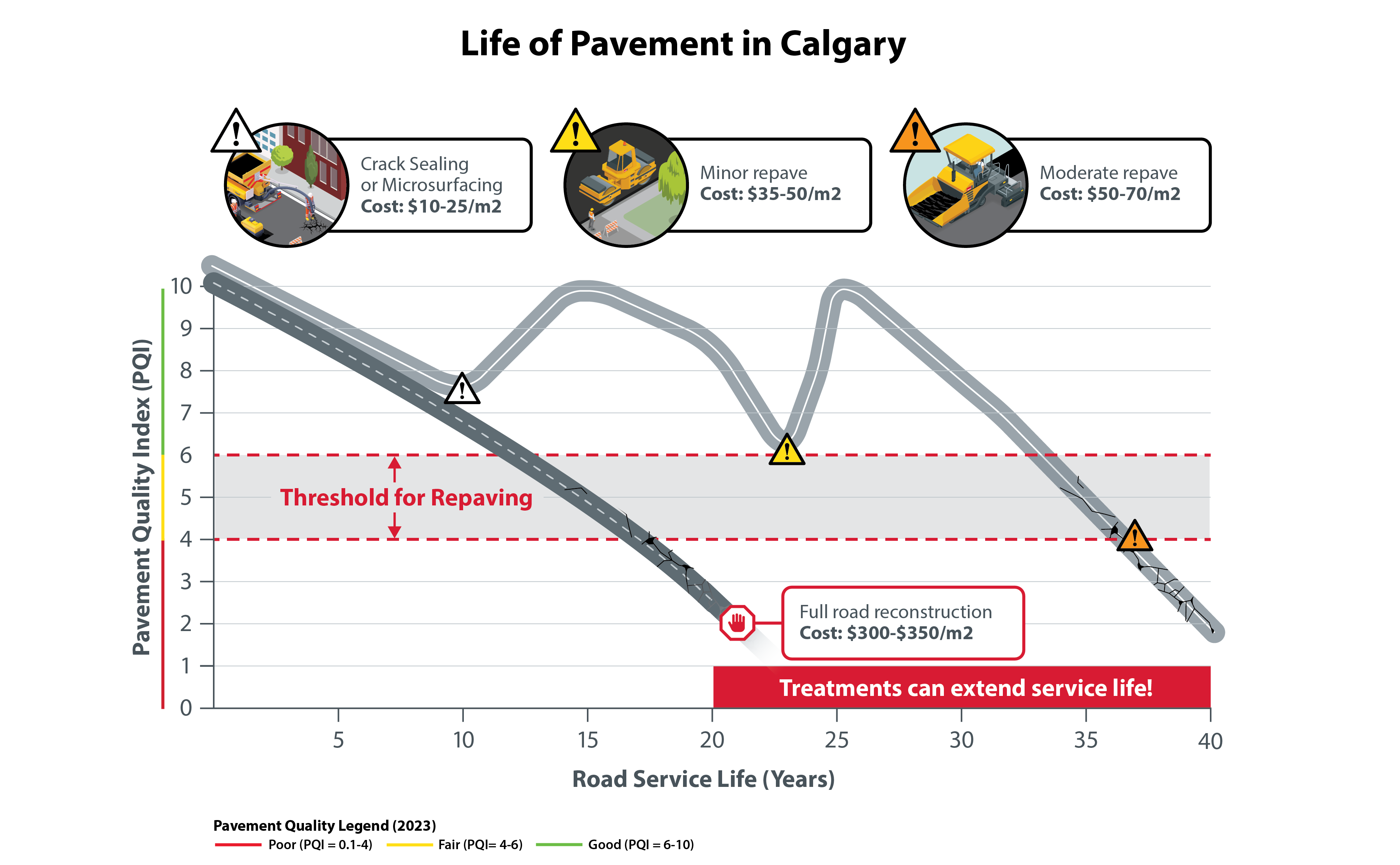Pavement quality
Whether you live in a new community, or your neighbourhood has been around for one hundred years, the roads in Calgary have grown alongside our city. These roads can tell a story about Calgary’s communities and how they continue to expand and change over time.
From the time pavement is laid, The City begins to monitor pavement quality. Calgary’s nearly 17,000 lane kilometres of pavement are inspected regularly, and that data is tracked and assessed using a pavement management data system. The City uses this data to assign condition ratings to our roads, and to prioritize and plan our annual road repair programs based on available budgets.

Setting a Level of Service for Pavement Quality in Calgary
In November 2024 City Council approved Administration’s recommendation to establish a minimum target for pavement quality level of service in Calgary. Setting a minimum standard based on various road types can help us ensure Calgarians can look forward to a safe, smooth ride wherever they travel.
Notice of MotionWhat is the target pavement quality level for service for roadways in Calgary?
| Road Type | Target Level of Service |
|---|---|
|
Arterial – major routes that carry high volumes of daily traffic (i.e. Crowchild, Glenmore Trail) |
60% of arterial roads in good or greater condition. |
|
Collector – connecting routes through communities that carry moderate amounts of traffic and transit vehicles (i.e. Kensington Road, Fairmount Drive) |
54% of collector roads in good or greater condition. |
|
Local – neighbourhood streets that carry low volumes of traffic (i.e. residential roads) |
42% of local roads in good or greater condition. |
How we determine Pavement Quality Index (PQI)
The City uses a multi-step process that aligns with industry best practices, to objectively evaluate the condition of Calgary’s road network and identify priorities for repair.
Step 1 - Condition assessment
Step 1 - Condition assessment
Step 1: The City does a condition assessment of the road. This involves capturing data on both the surface condition of the road, and the structure beneath the road. Calgary’s major roads are typically inspected bi-annually due to the volume of traffic they carry. Local roads, which are the roads in neighborhoods, are assessed every 4 years as they deteriorate more slowly.
Step 2 - PQI rating
Step 2 - PQI rating
Step 2: The data we collect is analyzed and translated into a condition rating called a Pavement Quality Index (PQI). Roads with a PQI values below 4 are in poor condition, between 4 and less than6 are in fair condition and 6 and above are in good condition. The PQI of a road can change from year to year. Roads are prioritized for repair based on their condition (PQI), traffic volume, road classes, bus lanes, proximity to schools/hospitals and coordination with other activities/projects in close proximity. In addition, the City evaluates different scenarios, including the effect of deferring the road, which may require more intensive intervention such as reconstruction, which may cost the City 7-10 times more budget.
Step 3 - Road repairs
Step 3 - Road repairs
Step 3: The City uses PQI and performs detailed engineering analysis to determine which roads require which treatments. We treat roadways at various condition ratings, not only poor roadways. In most cases, we repair or replace roads that have deteriorated, but we also want to fix small defects before they become bigger problems. Prior to repair, work is coordinated to ensure there are no conflicts with other major infrastructure or utility projects. The PQI also helps us forecast future repairs.
What does PQI rating mean on a roadway?
As of the end of the 2025 construction season, 38 percent of Calgary's roadways are classified as good or above condition, based on Pavement Quality Index. The Canadian national average is 61 percent of roads in good condition, based on data from other municipalities. 35 percent of Calgary's roadways are classified as fair condition, with 27 percent classified as poor.
| PQI | Condition rating |
|---|---|
| 6-10 |
Good Condition. Includes newer roadways, typically these roads have smooth driving surfaces and no visible defects. As road deteriorates, minimal rutting and or defects may become present. Roads may have been subjected to treatments to extend surface life, such as repaving. |
| 4<6 |
Fair condition. Roadway may have some visible defects and driving surface may be uneven in certain areas. Lower condition ratings can be based on several factors, including things like rutting, potholes and smoothness of the road. |
| 0<4 |
Poor condition. Roadway will have several visible defects and driving surface will be uneven along the entire stretch of roadway. Full road reconstruction may be required at this stage. |

